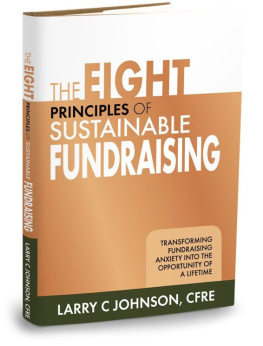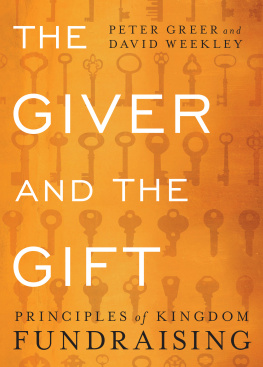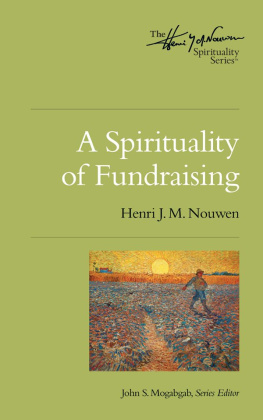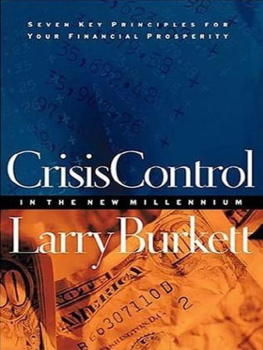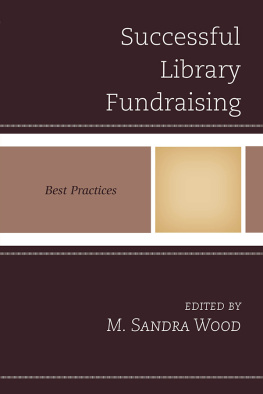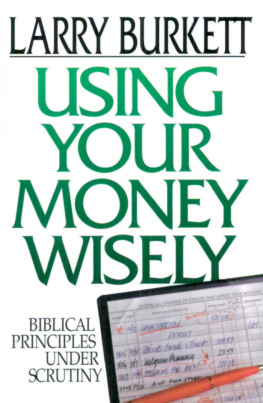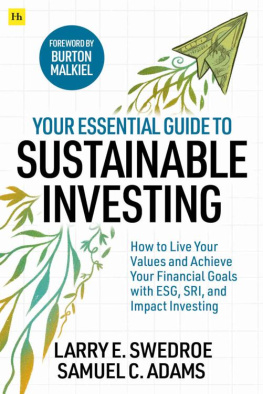Larry C Johnson - The Eight Principles of Sustainable Fundraising
Here you can read online Larry C Johnson - The Eight Principles of Sustainable Fundraising full text of the book (entire story) in english for free. Download pdf and epub, get meaning, cover and reviews about this ebook. year: 2011, publisher: Aloha Publishing, genre: Home and family. Description of the work, (preface) as well as reviews are available. Best literature library LitArk.com created for fans of good reading and offers a wide selection of genres:
Romance novel
Science fiction
Adventure
Detective
Science
History
Home and family
Prose
Art
Politics
Computer
Non-fiction
Religion
Business
Children
Humor
Choose a favorite category and find really read worthwhile books. Enjoy immersion in the world of imagination, feel the emotions of the characters or learn something new for yourself, make an fascinating discovery.
- Book:The Eight Principles of Sustainable Fundraising
- Author:
- Publisher:Aloha Publishing
- Genre:
- Year:2011
- Rating:5 / 5
- Favourites:Add to favourites
- Your mark:
- 100
- 1
- 2
- 3
- 4
- 5
The Eight Principles of Sustainable Fundraising: summary, description and annotation
We offer to read an annotation, description, summary or preface (depends on what the author of the book "The Eight Principles of Sustainable Fundraising" wrote himself). If you haven't found the necessary information about the book — write in the comments, we will try to find it.
The Eight Principles of Sustainable Fundraising — read online for free the complete book (whole text) full work
Below is the text of the book, divided by pages. System saving the place of the last page read, allows you to conveniently read the book "The Eight Principles of Sustainable Fundraising" online for free, without having to search again every time where you left off. Put a bookmark, and you can go to the page where you finished reading at any time.
Font size:
Interval:
Bookmark:
The Eight Principles of Sustainable Fundraising: Transforming Fundraising Anxiety into the Opportunity of a Lifetime
by Larry C. Johnson
Copyright 2011 Larry C. Johnson
All rights reserved. No part of this book may be reproduced or transmitted in any form or by any means, electronic or mechanical, including photocopying, recording, or by any information storage and retrieval system, without permission in writing from the publisher.
Disclaimer: This publication is designed to provide accurate and authoritative information regarding the subject matter. The author and/or publisher disclaim any and all liability, directly or indirectly, for advice or information presented herein. The author and/or publisher do not assume any responsibility for errors, omissions, or interpretation of the subject matter herein.
Print ISBN: 978-1-61206-022-4
Cover design: by Cari Campbell, Cari Campbell Design
Interior layout: by Nick Zelinger, NZ Graphics
Library of Congress in Publication Data goes here
First Printing
Printed in the United States of America
Published by Aloha Publishing

To Connie, for her loving patience and support
BEING ASKED TO FUNDRAISE for a worthy charity or cause engenders both desire and feardesire to be successful for something you believe in, while being fearful that youre not up to the task or will even be rejected by those you solicit. If you have a similar reaction, rest assuredyoure in good company.
I once worked with a board member of a nonprofit organization who, by his personality and background, appeared to be virtually fearless. A Marine officer decorated for service in combat, he was also a successful businessman with his own engineering firm and stood six feet, three inches tall and ramrod straight. Having made a substantial gift in the fundraising campaign on which he was working, he was eager to ask others to join him. He approached an elderly dowager in the community known to be both generous and demanding. When he asked her for a gift, her response was, David, look me in the eye when you ask me for that kind of money. Confronted with the task of actually asking, he had apparently lost his nerve. It doesnt have to be that way.
When you hear the word fundraising, what comes to mind? You may think of the endless appeals for funds that appear in the mail ordont we love thisthe well-timed telephone solicitors call right at dinner. Responding to seemingly endless invitations to fundraising events, from charity auctions to golfing outings, you may openly wonder, Isnt there a better way to do this? In a word, yes. That better way is the straightforward set of principles described in the upcoming chapters. These principles, taken together and implemented consistently, will achieve the sustainable philanthropic revenue you are seeking for your organization. Seeking gifts for a worthy charitable undertaking should be one of the most rewarding and uplifting activities in which youll ever participate. Let me say that again. Seeking gifts for a worthy charitable organization or undertaking should be one of the most rewarding and uplifting activities in which youll ever participate.
Lets look at a hypothetical scenario. A well-informed volunteerperhaps someone you knowapproaches you on behalf of a worthwhile organization or charitable cause. During your conversation, she seeks to find how this organization and its work might resonate with your personal values and satisfy a deep-felt need for involvement with the greater good, to do something truly lasting and worthwhile, perhaps even leave a legacy. The volunteer then seeks to enlist your support by asking you to become a partner with the organizations leadership, thereby realizing goals that you, yourself, deem worthy. Once youve committed, if the organization keeps your faith by keeping you informed and involved, while earnestly soliciting your feedback, youre likely to become a long-term, if not lifetime, partner. Thats sustainable fundraising. Fundraising that is sustainable, even expandable, isnt really about money. Its about building partnerships between your organization and its donors, partnerships that are built upon mutually beneficial goals.
Unfortunately, few nonprofit organizations see their donors as investorspartners whose goals and aims are as important as the organizations. Most nonprofit organizations, almost out of necessity if nothing else, are on a figurative raise money treadmill, always scrambling to fund their operations and programmatic outreach in what seems to be a neverending struggle. By making money the object, rather than relationships, nonprofits fall into a trapthe same trap Jim Collins alluded to when he stated that money is an input of a nonprofit but not an output. The outputs, according to Collins, are life-changing outcomes that touch both giver and receiver. Being efficient is not the goal, being effective is. Organizations such as Teach for America and Habitat for Humanity understand this truth and have well-funded and successful fundraising programs that possess both an adequate internal infrastructure and a focus on relationships. As a result, both organizations continue to enjoy healthy bottom lines in their fundraising programs, year after year.
Growth, in both scope and sophistication, of the fundraising profession and industry hasnt done very much to encourage nonprofit organizations to view their donors as investors or serious partners. This is not to say professional fundraising hasnt been of immense benefit to our charitable organizations. Philanthropy in the United States has experienced tremendous growth during the past forty years or so, when good data became available. Some of this increase is undoubtedly due to the growth of professional development programs in nonprofit organizations. What professional development has brought us is the development system: a collection of fundraising programs in a given charitable organization that, taken together, approach various types of donors seeking gifts through varied vehicles and appeals. Some organizational development systems allow for donors to mature in their support of the organization over the donors lifetimes (moves management, for example) and a few even seriously encourage giving based upon a particular interest within the organization. Whats missing here is not so much the how as the why.
When the focus is on the how in fundraising, raising money becomes a process that manages commodities for inputs and outputs. Donors become cogs in a machineor worseresources merely to be mined. When the focus is on the why in fundraising, donors become participants integral to the effective outcomes for which the organization is striving; they become investors who are fully engaged in the organization.
Fundraising professionals themselves often contribute, sometimes unwittingly, to an organizational emphasis on program driven fundraising, which is driven by organizational initiatives. When fundraisers are evaluated primarily using cash-based or activity-related criteria, they develop, quite naturally, a month to month or quarter to quarter focus. The cash driven mindset can put fundraisers from the same organization in competition for the same donors, leading to donor confusion, fatigue or outright disgust.
By and large, even with the growing number of charitable organizations in the United States and increased sophistication in the fundraising profession, most organizations have, at best, a program delivery mindset as they reach out to their potential supporters. Its the classic inside-out, push marketing approach that for-profit companies have used, quite effectively, for decades. Businesses have only recently discovered the extraordinary power and leverage of pull or permission marketing. This approach seeks to engage prospective customers by learning about them and drawing them in first, before seeking a sale, rather than pushing out internally designed and approved products for their consumption. In this regard, charitable organizations have the intrinsic advantage over the for-profit companyif they choose to use it. Charitable organizations, by their very nature, provide an intangible, but quite powerful, incentive for donors to invest. Its the opportunity for true self-fulfillment, a legacy and the experience of a lifetimeparticipation in something truly greater than themselves.
Next pageFont size:
Interval:
Bookmark:
Similar books «The Eight Principles of Sustainable Fundraising»
Look at similar books to The Eight Principles of Sustainable Fundraising. We have selected literature similar in name and meaning in the hope of providing readers with more options to find new, interesting, not yet read works.
Discussion, reviews of the book The Eight Principles of Sustainable Fundraising and just readers' own opinions. Leave your comments, write what you think about the work, its meaning or the main characters. Specify what exactly you liked and what you didn't like, and why you think so.

